高中英语人教版必修一 Unit 5 课文内容
Unit 5 课文文本和翻译-高中英语人教版(2019)选择性必修第一册
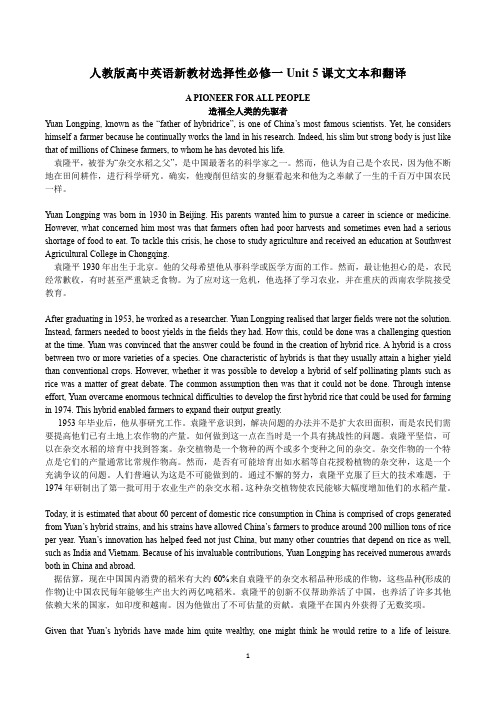
人教版高中英语新教材选择性必修一Unit 5课文文本和翻译A PIONEER FOR ALL PEOPLE造福全人类的先驱者Yuan Longping, known as the “father of hybridrice”, is one of China’s most famous scientists. Yet, he considers himself a farmer because he continually works the land in his research. Indeed, his slim but strong body is just like that of millions of Chinese farmers, to whom he has devoted his life.袁隆平,被誉为“杂交水稻之父”,是中国最著名的科学家之一。
然而,他认为自己是个农民,因为他不断地在田间耕作,进行科学研究。
确实,他瘦削但结实的身躯看起来和他为之奉献了一生的千百万中国农民一样。
Yuan Longping was born in 1930 in Beijing. His parents wanted him to pursue a career in science or medicine. However, what concerned him most was that farmers often had poor harvests and sometimes even had a serious shortage of food to eat. To tackle this crisis, he chose to study agriculture and received an education at Southwest Agricultural College in Chongqing.袁隆平1930年出生于北京。
人教版高中英语必修一unit1-unit5 重要单词、短语及课文详解
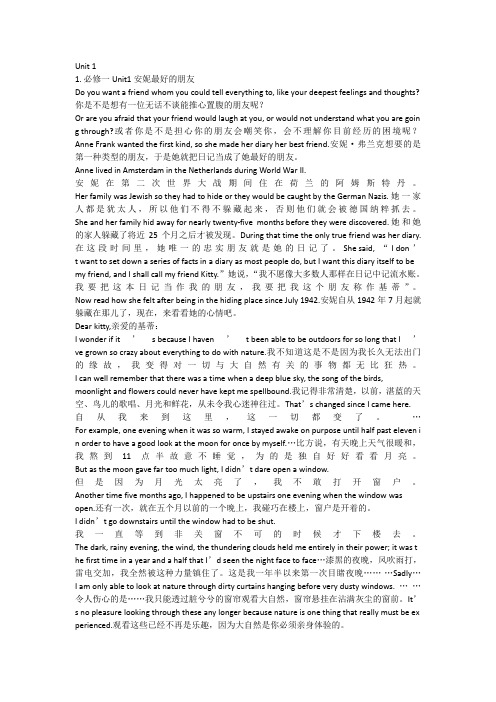
1. 必修一Unit1安妮最好的朋友Do you want a friend whom you could tell everything to, like your deepest feelings and thoughts?你是不是想有一位无话不谈能推心置腹的朋友呢?Or are you afraid that your friend would laugh at you, or would not understand what you are goin g through?或者你是不是担心你的朋友会嘲笑你,会不理解你目前经历的困境呢?Anne Frank wanted the first kind, so she made her diary her best friend.安妮·弗兰克想要的是第一种类型的朋友,于是她就把日记当成了她最好的朋友。
Anne lived in Amsterdam in the Netherlands during World War II.安妮在第二次世界大战期间住在荷兰的阿姆斯特丹。
Her family was Jewish so they had to hide or they would be caught by the German Nazis.她一家人都是犹太人,所以他们不得不躲藏起来,否则他们就会被德国纳粹抓去。
She and her family hid away for nearly twenty-five months before they were discovered.她和她的家人躲藏了将近25个月之后才被发现。
During that time the only true friend was her diary.在这段时间里,她唯一的忠实朋友就是她的日记了。
She said, “I don’t want to set down a series of facts in a diary as most people do, but I want this diary itself to be my friend, and I shall call my friend Kitty.”她说,“我不愿像大多数人那样在日记中记流水账。
高一英语人教版必修一Unit5课文内容
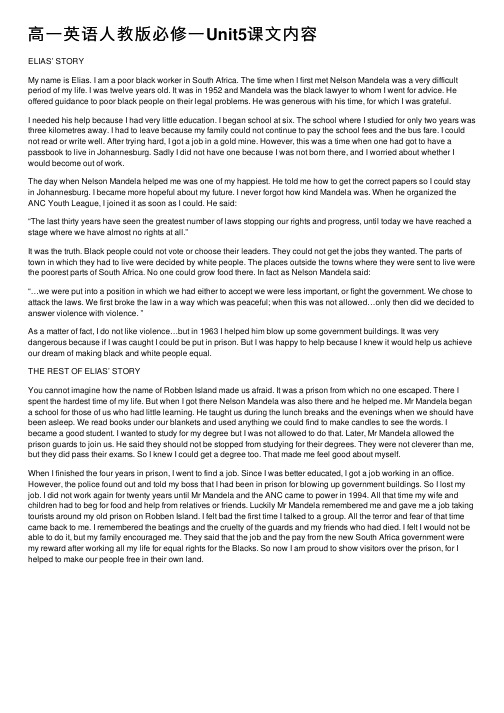
⾼⼀英语⼈教版必修⼀Unit5课⽂内容ELIAS’ STORYMy name is Elias. I am a poor black worker in South Africa. The time when I first met Nelson Mandela was a very difficult period of my life. I was twelve years old. It was in 1952 and Mandela was the black lawyer to whom I went for advice. He offered guidance to poor black people on their legal problems. He was generous with his time, for which I was grateful.I needed his help because I had very little education. I began school at six. The school where I studied for only two years was three kilometres away. I had to leave because my family could not continue to pay the school fees and the bus fare. I could not read or write well. After trying hard, I got a job in a gold mine. However, this was a time when one had got to have a passbook to live in Johannesburg. Sadly I did not have one because I was not born there, and I worried about whether I would become out of work.The day when Nelson Mandela helped me was one of my happiest. He told me how to get the correct papers so I could stay in Johannesburg. I became more hopeful about my future. I never forgot how kind Mandela was. When he organized the ANC Youth League, I joined it as soon as I could. He said:“The last thirty years have seen the greatest number of laws stopping our rights and progress, until today we have reached a stage where we have almost no rights at all.”It was the truth. Black people could not vote or choose their leaders. They could not get the jobs they wanted. The parts of town in which they had to live were decided by white people. The places outside the towns where they were sent to live were the poorest parts of South Africa. No one could grow food there. In fact as Nelson Mandela said:“…we were put into a position in which we had either to accept we were less important, or fight the government. We chose to attack the laws. We first broke the law in a way which was peaceful; when this was not allowed…only then did we decided to answer violence with violence. ”As a matter of fact, I do not like violence…but in 1963 I helped him blow up some government buildings. It was very dangerous because if I was caught I could be put in prison. But I was happy to help because I knew it would help us achieve our dream of making black and white people equal.THE REST OF ELIAS’ STORYYou cannot imagine how the name of Robben Island made us afraid. It was a prison from which no one escaped. There I spent the hardest time of my life. But when I got there Nelson Mandela was also there and he helped me. Mr Mandela began a school for those of us who had little learning. He taught us during the lunch breaks and the evenings when we should have been asleep. We read books under our blankets and used anything we could find to make candles to see the words. I became a good student. I wanted to study for my degree but I was not allowed to do that. Later, Mr Mandela allowed the prison guards to join us. He said they should not be stopped from studying for their degrees. They were not cleverer than me, but they did pass their exams. So I knew I could get a degree too. That made me feel good about myself.When I finished the four years in prison, I went to find a job. Since I was better educated, I got a job working in an office. However, the police found out and told my boss that I had been in prison for blowing up government buildings. So I lost my job. I did not work again for twenty years until Mr Mandela and the ANC came to power in 1994. All that time my wife and children had to beg for food and help from relatives or friends. Luckily Mr Mandela remembered me and gave me a job taking tourists around my old prison on Robben Island. I felt bad the first time I talked to a group. All the terror and fear of that time came back to me. I remembered the beatings and the cruelty of the guards and my friends who had died. I felt I would not be able to do it, but my family encouraged me. They said that the job and the pay from the new South Africa government were my reward after working all my life for equal rights for the Blacks. So now I am proud to show visitors over the prison, for I helped to make our people free in their own land.。
新人教版高中英语必修一unit5-Elias’-Story课文翻译教学文案
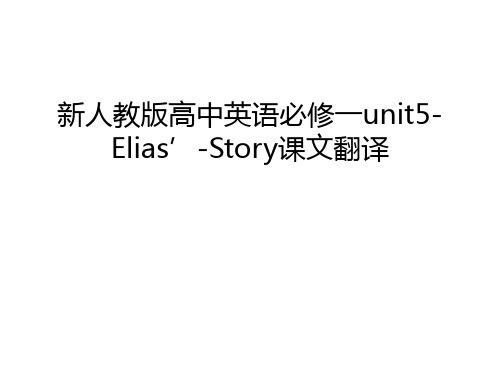
The parts of town in which they had to live were decided by white people.
他们所能住的城区都是由白人决定的。
The places outside the towns where they were sent to live were the poorest parts of South Africa.
我们选择向法律进攻。首先我们用和平的方式来破坏法律, 而当这种方式也得不到允许时,
only then did we decide to answer violence with violence.”
只有到这个时候,我们才决定用暴力反抗暴力。”
As a matter of fact, I do not like violence…
事实上,就像拉尔逊·曼德拉所说的:
“我们被置于这样一个境地:要么我们被迫接受低人一等的现实, 要么跟政府作斗争。
We chose to attack the laws. We first broke the law in a way which was peaceful; when this was not allowed
他告诉我要想在约翰内斯堡立住脚,应当如何获取所需证件。
I became more hopeful about my future.
我对自己的未来又充满了希望。
I never forgot how kind Mandela was.
我永远也忘记不了他对我的恩情,
When he organized the ANC Youth League, I joined it as soon as I could. 当他组织了非国大青年联盟时,我马上就参加了这个组织。他们被Βιβλιοθήκη 发去住的城外地区是南非最贫穷的地区。
人教版高中英语高一 上学期必修一unit5 Nelsonmandela reading+知识点(共29页)
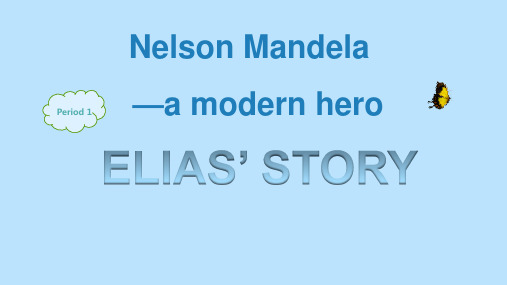
在此录入上述图表的描述说
在此录入上述图表的描述说
people to get the same 明,在此录入上述图表的描 述说明,在此录入上述图表
明,在此录入上述图表的描 述说明,在此录入上述图表
的描述说明。
的描述说明。
rights as white people.
添加标题
在此录入上述图表的描述说 明,在此录入上述图表的描 述说明,在此录入上述图表
Nelson Mandela Period 1 —a modern hero
Warming up
Guessing game
Once he was a member of NBA. He is Chinese. He is the tallest basketball player in China.
The text mainly tells us the poor black worker 1. __E_li_a_s_ got help and encouragement from 2. __N_e_l_so_n_M__a_n_d_e_la_.
Fast reading
Reading strategies: Make a guess according to the title before reading.
人教版高中英语高一 上学期必修一unit5 Nelsonmandela reading+知识点(共29页)
人教版高中英语高一 上学期必修一unit5 Nelsonmandela reading+知识点(共29页)
My name is Elias. I am a poor black worker in South Africa. The time [when I first met Nelson Mandela] was a very difficult period of my life. I was twelve years old. It was in 1952 and Mandela was the black lawyer [to whom I went for advice]. He offered guidance to poor black people on their legal problems. He was generous with his time, [for which I was grateful.]
Unit 5 Language points 课件-高中英语人教版(2019)选择性必修第一册
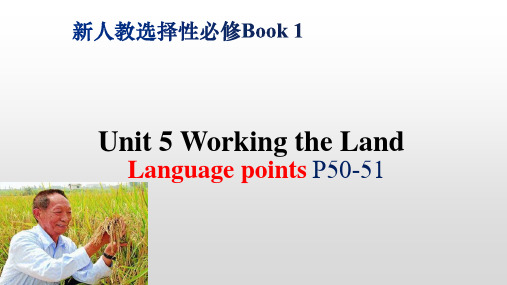
词汇精讲 句型剖析
课前•基础认知 课堂•重难突破
学以致用 单句语法填空 (1)She gives the impression of being generous,but in reality (real) she is a very selfish girl. (2)I didn’t realise (real) that you were not happy.
词汇精讲 句型剖析
课前•基础认知 课堂•重难突破
语境领悟 (1)Given his age,he is very strong and healthy. 考虑到他的年龄,他已经非常强壮健康了。 (2)Given that the students need more exercise,the head teacher has decided to add more PE classes. 考虑到学生们需要更多的锻炼,校长已决定增加更多体 育课。
vt.出产(作物);产生(收益、效益等) yield to sb/(doing) sth 屈服于某人/做某事 yield sth/sb up (to sb)放弃
课前•基础认知 课堂•重难突破
词汇精讲 句型剖析
学以致用 单句语法填空 (1)It’s polite to yield up your seat to an old lady on the
replace his old one. (3)There is a possibility of severe water shortages (short)
in the foreseeable future. (4) Shortly (short) after he left the bus station,came a
人教版高中英语必修第一册Unit 5 教学课件 Reading and Thinking

3. It dates back several thousand years to the use of longgu …它可以追溯到数千 年前使用龙骨的时期……
date back to =date from: to be made or begun at a particular time in the past 追溯 到……
radio down. __如__果__你__把__收__音__机__的__音__量__调__低__一__些__,__我__会__不_ __胜__感__激__。_____________________________
7. Scanning is looking at the text quickly to find specific information…速读是快速查 看文本以查找特定的信息……
specific adj. a specific thing, person, or
group is one particular thing, person, or group 特定的;明确的;具体的
eg Could you be more specific about what you’re looking for? (翻译) 你在找什么,能再说的具体些吗?
2) We didn't appreciate that he was seriously
ill. ___我__们__没__有__意__识__到__他__的__病__情__很__严__重__。________
_______________________________________
3) I’d appreciate it if you would turn the
2019年人教版高中英语 必修一 Unit5 《Nelson Mandela ---a modern hero ---Reading》 课件 (共57张PPT)

8. die for 为…而死
1) They di_e_d_f_o_r___ the people; their death is weightier than Mount Tai.
2) Many people d_ie_d__fo_r____ need of food.
3) I’m d_y_in_g__fo_r__ a cup of water.
⑵ 质量比数量更重要。
__Q_u__a_li_t_y__matters more than q__u_a_n_t_i_ty_.
2.active adj.积极的;活跃的
be active in ...在某方面很积极,很活跃
派生:act v.& n.行动 actively adv.积极地;活跃地 activity n.活动 actor n.男演员
13. period n. 学时,课时,一段时间,时期,周期
1) She studied French history for a long p_er_i_o_d_s_ of time.
2) Let’s finish this p_e_r_io_d__ and have a break.
3) We have six p_e_r_io_d_s_of science a week.
⑴ She w__a_s_e_d_u_c_a_t_ed(educate) in England in the 1930s.
⑵ An__e_d_u_c_a_t_o_r_ (educate) must first educate himself.
⑶ She has had a good__e_d_u_c_a_ti_o_n_ (educate).
Unit 5 Nelson Mandela ---a Modern Hero
高中英语人教版新教材(选择性必修第一册)课文 Unit 5 Reading and Thinking课文填空和中英文翻译(含听力)
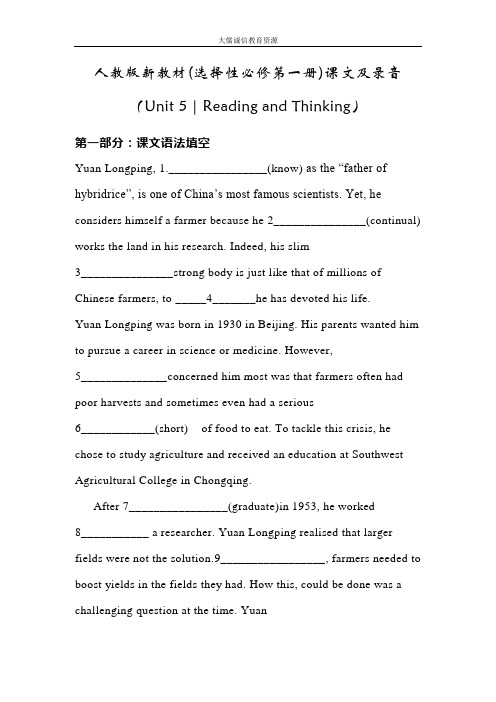
人教版新教材(选择性必修第一册)课文及录音(Unit 5 | Reading and Thinking)第一部分:课文语法填空Yuan Longping, 1.________________(know) as the “father of hybridrice”, is one of China’s most famous scientists. Yet, he considers himself a farmer because he 2_______________(continual) works the land in his research. Indeed, his slim3_______________strong body is just like that of millions of Chinese farmers, to _____4_______he has devoted his life.Yuan Longping was born in 1930 in Beijing. His parents wanted him to pursue a career in science or medicine. However,5______________concerned him most was that farmers often had poor harvests and sometimes even had a serious6____________(short) of food to eat. To tackle this crisis, he chose to study agriculture and received an education at Southwest Agricultural College in Chongqing.After 7________________(graduate)in 1953, he worked8___________ a researcher. Yuan Longping realised that larger fields were not the solution.9_________________, farmers needed to boost yields in the fields they had. How this, could be done was a challenging question at the time. Yuan10_______________(convince) that the answer could be found in the creation of hybrid rice. A hybrid is a cross between two or more varieties of a species. One characteristic of hybridsis11______________ they usually attain a higher yield than conventional crops. However, 12___________it was possible to develop a hybrid of self-pollinating plants such as rice was a matter of great debate. The common 13_______________(assume)then was that it could not be done. Through intense effort, Yuan overcame enormous technical difficulties to develop the first hybrid rice that could be used for farming in 1974. This hybrid enabled farmers to expand their output greatly.Today, it ______14__________(estimate) that about 60 percent of domestic rice consumption in China is comprised of crops generated f rom Yuan’s hybrid strains, and his strains have allowed China’s farmers to produce around 200 million tons of rice per year. Yuan’s innovation has helped feed not just China, but many other countries that depend on rice as well, such as India and Vietnam. Because of his invaluable 15________________(contribute) , Yuan Longping has received numerous awards both in China and abroad.Given that Yuan’s hybrids have made him quite wealthy, one might think he would retire to a life of leisure. However, this is far from thecase. Deep down, Yuan is still very much a farmer at heart. As a man of the soil, he cares little for celebrity or money. Instead, he makes large donations to support agricultural research.16______________impresses people most about Yuan Longpingis his ongoing ability to fulfill his dreams. Long ago, he envisioned rice plants as tall as sorghum, with each ear of rice as big as a broom, and each grain of rice as huge as a peanut. He succeeded in producing a kind of rice that could feed more people at home and abroad. His latest vision for “seawater rice” has also become a reality, and potentially opened up nearly one million square kilometres of salty land in China for rice production. 17_________________his advanced years, Yuan Longping is still young at heart and full of vision, and everyone is waiting to see what he will dream up next. 1.________________2__________________3_________________4__________________5______________6___________7_____________8___________9______________10-____________11_______________12________________________13______________ 14_____________15___________16______________17_________答案1.known2.continually3.but4.whom5.what6.shortage7.graduating8.as9.Instead10.was convinced11.that12.whether13.assumption14.is estimated15.contributions16.What17.Despite第二部分:A PIONEER FOR ALL PEOPLE造福全人类的先驱者Yuan Longping, known as the “father of hybridrice”, is one of China’s most famous scientists. Yet, he considers himself a farmer because he continually works the land in his research. Indeed, hisslim but strong body is just like that of millions of Chinese farmers, to whom he has devoted his life.袁隆平,被誉为“杂交水稻之父”,是中国最著名的科学家之一。
新人教版高中英语必修一课文及翻译(word-精校版)

新人教版高中英语必修一课文原文及翻译(Word精校版)Welcome Unit 欢迎单元Reading and ThinkingFIRST IMPRESSION 第一印象Han Jing's World7:00a.m.So this is it-senior high school at last. I'm not outgoing so I’m a little anxious right now. I want to make a good first impression. Will I make any friends? What if no one talks to me?晚上10:45韩静的世界早上7:00这就是了一一终于到了高中学校!我性格并不外向,所以现在感觉有点焦虑。
我想给别人留下良好的第一印象。
我会交到朋友吗?要是没人跟我说话怎么办呢?12:30p.mI just had my first maths class at senior high school! The class was difficult, but the teacher was kind and friendly. He even told us a funny story and everyone laughed so much! I found most of my classmates and teachers friendly and helpful.中午12:30我刚刚上完高中的第一节数学课!这课(内容)很难,但老师却很友善。
他还给我们讲了笑话,惹得每个人都哈哈大笑!我觉得我的大多数同学和老师都很友好,而且乐于助人。
5:32p.mThis afternoon, we had our chemistry class in the science lab. The lab is new and the lesson was great, but the guy next to me tried to talk to me the whole time. I couldn’t concentrate on the experiment. I really wanted to tell him to please be quiet and leave me alone.下午5:32今天下午,我们在科学实验室上化学课。
人教版高中英语 课文原文 第一册上下 手机电子书,方便随时学习
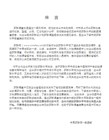
第一册 上 Unit 2 English around the world
READING
ENGLISH AROUND THE WORLD
English is a language spoken all around the world. There are more than 42 countries where the majority of the people speak English. Most native speakers of English are found in the United kingdom, the United States of America, Canada, Australia, South Africa, Ireland and New Zealand. In total, for more than 375 million people English is their mother tongue. An equal number of people learn English as a second language. These people will perhaps speak the language of their own country at home with their family, but the language of the government, schools, newspapers and TV is English. This situation is found Байду номын сангаасn countries such as India, Pakistan, Nigeria and the Philippines.
必修一 Unit 5 2022-2023学年高一英语课文详解(人教版2019必修第二册)

ups and downs
Ups and downs 时好时坏,起伏波折
"The team had its ups and downs during the season,"
这个球队整个赛季的表现时好时坏,起伏不定。
"The heavyweight champion had his ups and downs in his
boxing career,"
这个重量级拳击冠军的拳击生涯有高潮,也有低谷。
"We have had our ups and downs like all married couples,"
跟所有夫妻一样,我们的婚姻生活也是既有美满也有摩擦
。
长难句理解
定语从句
There are many reasons why this has been possible,
seen intoday’s hanzi.
汉语书写系统
语书写系统。
长难句理解
定语从句
China is widely known for its ancient civilisation
which has continued all the way through into
modern times, despite the many ups and downs in
its history.
让步状语从句
中国以其古老的文明而闻名,尽管历史上
有许多起起伏伏,但它一直延续到现代。
is known for
be known as “作为……而著名”
1. Liu Huan is known as a singer.
(完整版)高中英语人教版必修一全册课文内容电子版.docx
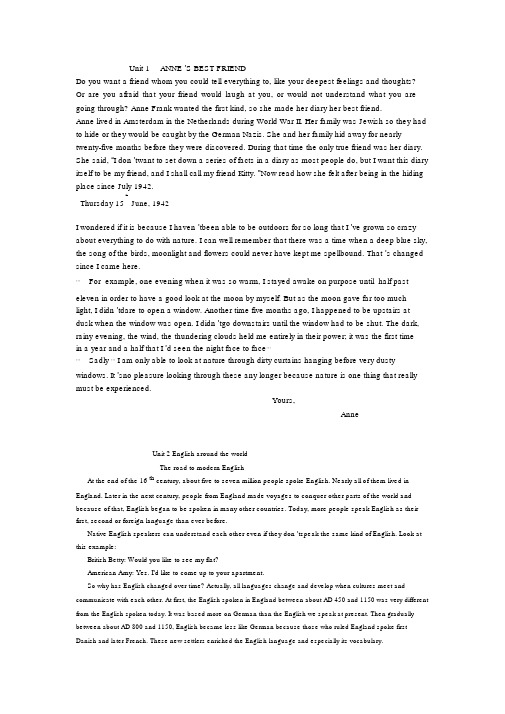
Unit 1 ANNE ’S BEST FRIENDDo you want a friend whom you could tell everything to, like your deepest feelings and thoughts?Or are you afraid that your friend would laugh at you, or would not understand what you are going through? Anne Frank wanted the first kind, so she made her diary her best friend.Anne lived in Amsterdam in the Netherlands during World War II. Her family was Jewish so they had to hide or they would be caught by the German Nazis. She and her family hid away for nearly twenty-five months before they were discovered. During that time the only true friend was her diary. She said, “I don ’twant to set down a series of facts in a diary as most people do, but I want this diary itself to be my friend, and I shall call my friend Kitty. ”Now read how she felt after being in the hiding place since July 1942.thThursday 15June, 1942I wondered if it is because I haven ’tbeen able to be outdoors for so long that I ’ve grown so crazy about everything to do with nature. I can well remember that there was a time when a deep blue sky, the song of the birds, moonlight and flowers could never have kept me spellbound. That ’s changed since I came here.⋯For example, one evening when it was so warm, I stayed awake on purpose until half pasteleven in order to have a good look at the moon by myself. But as the moon gave far too much light, I didn ’tdare to open a window. Another time five months ago, I happened to be upstairs at dusk when the window was open. I didn ’tgo downstairs until the window had to be shut. The dark, rainy evening, the wind, the thundering clouds held me entirely in their power; it was the first timein a year and a half that I ’d seen the night face to face⋯⋯Sadly ⋯ I am only able to look at nature through dirty curtains hanging before very dustywindows. It ’sno pleasure looking through these any longer because nature is one thing that really must be experienced.Yours,AnneUnit 2 English around the worldThe road to modern EnglishAt the end of the 16 th century, about five to seven million people spoke English. Nearly all of them lived in England. Later in the next century, people from England made voyages to conquer other parts of the world and because of that, English began to be spoken in many other countries. Today, more people speak English as their first, second or foreign language than ever before.Native English speakers can understand each other even if they don ’tspeak the same kind of English. Look at this example:British Betty: Would you like to see my flat?American Amy: Yes. I’d like to come up to your apartment.So why has English changed over time? Actually, all languages change and develop when cultures meet andcommunicate with each other. At first, the English spoken in England between about AD 450 and 1150 was very differentfrom the English spoken today. It was based more on German than the English we speak at present. Then graduallybetween about AD 800 and 1150, English became less like German because those who ruled England spoke firstDanish and later French. These new settlers enriched the English language and especially its vocabulary.So by the 1600 ’s Shakespeare was able to make use of a wider vocabulary than ever before. In 1620 some British settlers moved to America. Later in the 18 th century some British people were taken to Australia too. English began to be spoken in both countries.Finally by the 19 th century the language was settled. At that time two big changes in English spelling happened: first Samuel Johnson wrote his dictionary and later Noah Webster wrote The America Dictionary of the English Language. The latter gave a separate identity to American English spelling.English now is also spoken as a foreign or second language in South Asia. For example, India has a very large number of fluent English speakers because Britain ruled India from 1765 to 1947. During that time English became the language for government and education. English is also spoken in Singapore and Malaysia and countries in Africa such as South Africa. Today the number of people learning English in China is increasing rapidly. In fact, China may have the largest number of English learners. Will Chinese English develop its own identity? Only time will tell.STANDARD ENGLISH AND DIALECTSWhat is standard English? Is it spoken in Britain, the US, Canada, Australia, India and New Zealand? Believeit or not, there is no such thing as standard English. This is because in the early days of radio, those who reported the news were expected to speak excellent English. However, on TV and the radio you will hear differences in the way people speak.When people use words and expressions different from “standard language”, it is called a dialect. American English has many dialects, especially the midwestern, southern, African American and Spanish dialects. Even in some parts of the USA, two people from neighboring towns speak a little differently. American English has so many dialects because people have come from all over the world.Geography also plays a part in making dialects. Some people who live in the mountains of the eastern USAspeak with an older kind of English dialect. When Americans moved from one place to another, they took theirdialects with them. So people from the mountains in the southeastern USA speak with almost the same dialect as people in the northwestern USA. The USA is a large country in which many different dialects are spoken.Although many Americans move a lot, they still recognize and understand each other ’s dialects.Unit 3 JOURNEY DOWN THE MEKONGPART I THE DREAM AND THE PLANMy name is Wang Kun. Ever since middle school, my sister Wang Wei and I have dreamed about taking a great bike trip. Two years ago she bought an expensive mountain bike and then she persuaded me to buy one. Last year, she visited our cousins, Dao Wei and Y u Hang at their college in Kunming. They are Dai and grew up in western Yunnan Province near the Lancang River, the Chinese part of the river that is called the Mekong River in other countries. Wang Wei soon got them interested in cycling too. After graduating from college, we finally gotthe chance to take a bike trip. I asked my sister, “Where are we going? ”It was my sister who first had the idea to cycle along the entire Mekong River from where it begins to where it ends. Now she is planning our schedule forthe trip.I am fond of my sister but she has one serious shortcoming. She can be really stubborn. Although she didn ’t know the best way of getting to places, she insisted that she organize the trip properly. Now I know that the proper way is always her way. I kept asking her, “When are we leaving and when are we coming back?”I asked her whether she had looked at a map yet. Of course she hadn ’t; my sister doesn ’tcare about details. So I told her that the source of the Mekong is in Qinghai Province. She gave me a determined look--the kind that said she would not change her mind. When I told her that our journey would begin at an altitude of more than 5,000 metres, she said itwould be an interesting experience. I know my sister well. Once she has made up her mind, nothing can change it. Finally, I had to give in.Several months before our trip, Wang Wei and I went to the library. We found a large atlas with good maps that showed details of world geography. From the atlas we could see that the Mekong River begins in a glacier on a mountain in Qinghai Province. At first the river is small and the water is clear and cold. Then it begins to move quickly. It becomes rapids as it passes through deep valleys, travelling across western Yunnan Province. Sometimes the river becomes a waterfall and enters wide valleys. We were both surprised to learn that half of the river is in China. After it leaves China and high altitude, the Mekong becomes wide, brown and warm. As it enters Southeast Asia, its pace slows. It makes wide bends or meanders through low valleys to the plains where rice grows. At last, the river delta enters the South China Sea.PART II A NIGHT IN THE MOUNTAINSAlthough it was autumn, the snow was already beginning to fall in Tibet. Our legs were so heavy and cold that they felt like blocks of ice. Have you ever seen snowmen ride bicycles? That ’s what we looked like! Along the way children dressed in long wool coats stopped to look at us. In the late afternoon we found it was so cold that our water bottles froze. However, the lakes shone like glass in the setting sun and looked wonderful. Wang Wei rode in front of me as usual. She is very reliable and I knew I didn ’tneed to encourage her. To climb the mountains was hard work but as we looked around us, we were surprised by the view. We seemed to be able to see for miles. At one point we were so high that we found ourselves cycling through clouds. Then we began going down the hills.It was great fun especially as it gradually became much warmer. In the valleys colourful butterflies flew around us and we saw many yaks and sheep eating green grass. At this point we had to change our caps, coats, glovesand trousers for T-shirts and shorts.In the early evening we always stop to make camp. We put up our tent and then we eat. After supper Wang Wei put her head down on her pillow and went to sleep but I stayed awake. At midnight the sky became clearer and the stars grew brighter. It was so quiet. There was almost no wind- only the flames of our fire for company. As I lay beneath the stars I thought about how far we had already travelled.We will reach Dali in Yunnan Province soon, where our cousins Dao Wei and Yu Hang will join us. Wecan hardly wait to see them!Unit 4 A NIGHT THE EARTH DIDN’T SLEEPStrange things were happening in the countryside of northeast Hebei. For three days the water in the village wells rose and fell. Farmers noticed that the well walls had deep cracks in them. A smelly gas came out of the fields looking for places to hide. Fish jumped out of their bowls and ponds. At about 3:00 am on July 28, 1976, some people saw bright lights in the sky. The sound of planes could be heard outside the city of Tangshan even when no planes were in the sky. In the city, the water pipes in some buildings cracked and burst. But the one million people of the city, who thought little of these events, were asleep as usual that night.At 3:42 am everything began to shake. It seemed as if the world was at an end! Eleven kilometres directly below the city one of the greatest earthquakes of the 20th century had begun. It was felt in Beijing, which is more than two hundred kilometres away. One-third of the nation feltit. A huge crack that was eight kilometres long and thirty metres wide cut across houses, roadsand canals. Steam burst from holes in the ground. Hard hills of rock became rivers of dirt. In fifteen terrible seconds a large city lay in ruins. The sufferings of the people was extreme. Two-thirds ofthem died or were injured during the earthquake. The number of people who were killed or seriously injured reached more than 400,000.But how could the survivors believe it was natural? Everywhere they looked nearly everything was destroyed. All of the city ’s hospital, 75 % of its factories and buildings and 90 % of its homes were gone. Bricks covered the ground like red autumn leaves. No wind, however, could blow them away. Two dams fell and most of the bridges also fell or were not safe for travelling. The railway tracks were now useless pieces of steel. Tens of thousands of cows would never give milk again. Half a million pigs and millions of chickens were dead. Sand now filled the wells instead of water. People were shocked. Then, later that afternoon, another big quake which was almost as strong as the first one shook Tangshan. Water, food, and electricity were hard to get. People began to wonder how long the disaster would last.All hope was not lost. Soon after the quakes, the army sent 150,000 soldiers to Tangshan to help the rescue workers. Hundreds of thousands of people were helped. The army organized teams to dig out those who were trapped and to bury the dead. To the north of the city, most of the 10,000 miners were rescued from the coal mines there. Workers built shelters for survivors whose homes had been destroyed. Fresh water was taken to the city by train, truck and plane. Slowly, the city began to breathe again.UNIT 5 ELIAS ’STORYMy name is Elias. I am a poor black worker in South Africa. The time when I first met Nelson Mandela was a very difficult period of my life. I was twelve years old. It was in 1952 and Mandela was the black lawyer to whom Iwent for advice. He offered guidance to poor black people on their legal problems. He was generous with his time, for which I was grateful.I needed his help because I had very little education. I began school at six. The school where I studied for only two years was three kilometres away. I had to leave because my family could not continue to pay the school fees and the bus fare. I could not read or write well. After trying hard, I got a job in a gold mine. However, this was atime when one had got to have a passbook to live in Johannesburg. Sadly I did not have one because I was not born there, and I worried about whether I would become out of work.The day when Nelson Mandela helped me was one of my happiest. He told me how to get the correct papers so I could stay in Johannesburg. I became more hopeful about my future. I never forgot how kind Mandela was. When he organized the ANC Youth League, I joined it as soon as I could. He said:“The last thirty years have seen the greatest number of laws stopping our rights and progress, until today we have reached a stage where we have almost no rights at all.”It was the truth. Black people could not vote or choose their leaders. They could not get the jobs they wanted. The parts of town in which they had to live were decided by white people. The places outside the towns where they were sent to live were the poorest parts of South Africa. No one could grow food there. In fact as Nelson Mandela said:“⋯ we were put into a position in which we had either to accept we were less important, or fight the government.⋯only We chose to attack the laws. We first broke the law in a way which was peaceful; when this was not allowedthen did we decided to answer violence with violence. ”As a matter of fact, I do not like violence ⋯ but in 1963 I helped him blow up some government buildings. It was very dangerous because if I was caught I could be put in prison. But I was happy to help because I knew it would help us achieve our dream of making black and white people equal.THE REST OF ELIAS ’STORYYou cannot imagine how the name of Robben Island made us afraid. It was a prison from which no one escaped. There I spent the hardest time of my life. But when I got there Nelson Mandela was also there and he helped me. Mr Mandela began a school for those of us who had little learning. He taught us during the lunch breaks and the evenings when we should have been asleep. We read books under our blankets and used anything we could find to make candles to see the words. I became a good student. I wanted to study for my degree but I was not allowed to do that. Later, Mr Mandela allowed the prison guards to join us. He said they should not be stopped from studying for their degrees. They were not cleverer than me, but they did pass their exams. So I knew I could get a degree too. That made me feel good about myself.When I finished the four years in prison, I went to find a job. Since I was better educated, I got a job working inan office. However, the police found out and told my boss that I had been in prison for blowing up government buildings. So I lost my job. I did not work again for twenty years until Mr Mandela and the ANC came to power in 1994. All that time my wife and children had to beg for food and help from relatives or friends. Luckily Mr Mandela remembered me and gave me a job taking tourists around my old prison on Robben Island. I felt bad the first time I talked to a group. All the terror and fear of that time came back to me. I remembered the beatings and the cruelty of the guards and my friends who had died. I felt I would not be able to do it, but my family encouraged me. They said that the job and the pay from the new South Africa government were my reward after working all my life for equal rights for the Blacks. So now I am proud to show visitors over the prison, for I helped to makeour people free in their own land.。
新教材人教版高中英语选择性必修第一册Unit5 Working The Land 精品教学课件
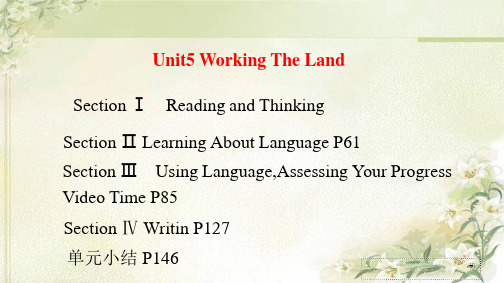
词汇认知 阅读自测
2.Why did Yuan decide to study agriculture? A.His parents wanted him to pursue a career in agriculture. √B.He wanted to deal with the crisis of shortage of food. C.He wanted to be the “father of hybrid rice”. D.He was interested in agriculture.
词汇精讲 句型剖析
1.【教材原文】Indeed,his slim but strong body is just like that of millions of Chinese farmers,to whom he has devoted his life.(Page 50)
事实上,他瘦削但结实的身躯看起来和他为之奉献了一生的 千千万万的中国农民一样。
词汇认知 阅读自测
6. attain vt.(通常经过努力)获得;得到 7. overcome vt.克服;解决;战胜 8. output n.产量;输出;输出量 vt.输出 9. domestic adj.本国的;国内的;家用的;家庭的 10. comprise vt.包括;包含;由……组成 11. strain n.(动、植物的)系;品种;拉伤;压力 12. leisure n.闲暇;休闲;空闲
词汇认知 阅读自测
21.convince vt.使相信;使确信;说服 → convinced adj.确信的;深信的 → convincing adj.令人信服的;有说服力的 22.characteristic n.特征;特点;品质 adj.典型的;独特的 → character n.性格,品质;特性;角色 23.conventional adj.传统的;习惯的 → convention n.大会;惯例 → conventionally adv.照惯例地
高中英语人教版必修一全册课文内容电子版
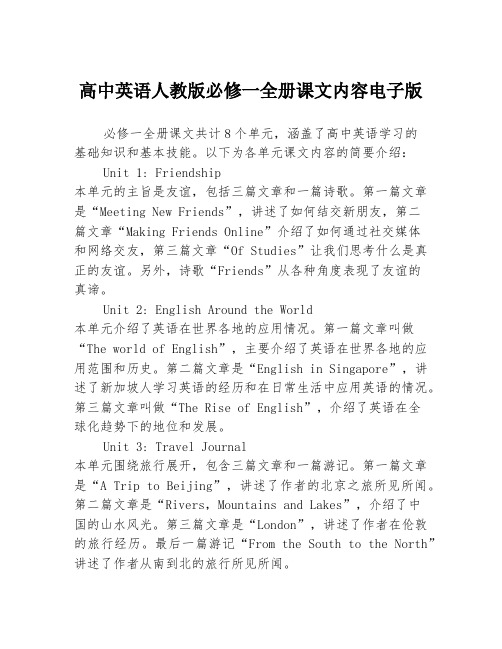
高中英语人教版必修一全册课文内容电子版必修一全册课文共计8个单元,涵盖了高中英语学习的基础知识和基本技能。
以下为各单元课文内容的简要介绍:Unit 1: Friendship本单元的主旨是友谊,包括三篇文章和一篇诗歌。
第一篇文章是“Meeting New Friends”,讲述了如何结交新朋友,第二篇文章“Making Friends Online”介绍了如何通过社交媒体和网络交友,第三篇文章“Of Studies”让我们思考什么是真正的友谊。
另外,诗歌“Friends”从各种角度表现了友谊的真谛。
Unit 2: English Around the World本单元介绍了英语在世界各地的应用情况。
第一篇文章叫做“The world of English”,主要介绍了英语在世界各地的应用范围和历史。
第二篇文章是“English in Singapore”,讲述了新加坡人学习英语的经历和在日常生活中应用英语的情况。
第三篇文章叫做“The Rise of English”,介绍了英语在全球化趋势下的地位和发展。
Unit 3: Travel Journal本单元围绕旅行展开,包含三篇文章和一篇游记。
第一篇文章是“A Trip to Beijing”,讲述了作者的北京之旅所见所闻。
第二篇文章是“Rivers,Mountains and Lakes”,介绍了中国的山水风光。
第三篇文章是“London”,讲述了作者在伦敦的旅行经历。
最后一篇游记“From the South to the North”讲述了作者从南到北的旅行所见所闻。
Unit 4: Amazing Technology本单元探讨了科技的发展和应用。
第一篇文章“Technology Real or Fake?”让我们思考科技是否真的是对人类有益的。
第二篇文章“Technological Advances in Healthcare”介绍了医疗科技的发展和应用。
2019人教新版高中英语必修一unit5 课文课件
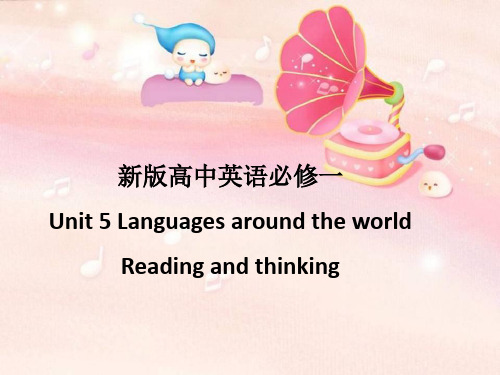
Scanning is looking at the text quickly to find specific information , such as dates or numbers.
plete the passage with the correct words and phrase below .
课文重点句型
1.句型公式: That/This is或was a time when….. 这是……的时期
拓展: There was a time when… 曾经有一段时间……
That was a time when the girl lost the power of speech.
There was a time when women were not allowed to go to school.
4…..an important means by which China’s present is connected … 5….the classic works which were written by Chinese …. 6….Chinese calligraphy , which has become an …..
calligraphy started . Chinese writing was first don____symbols onto bones and shells ,but as it developed into a writing __s_y_s_t_e_m______,it also developed
system
carving means
dates back classic civilisation
- 1、下载文档前请自行甄别文档内容的完整性,平台不提供额外的编辑、内容补充、找答案等附加服务。
- 2、"仅部分预览"的文档,不可在线预览部分如存在完整性等问题,可反馈申请退款(可完整预览的文档不适用该条件!)。
- 3、如文档侵犯您的权益,请联系客服反馈,我们会尽快为您处理(人工客服工作时间:9:00-18:30)。
必修一Unit 5 课文内容1.He was the first man to land on the moon in July 1969.本句中,名词man被序数词the first修饰,后面的不定式短语to land on the moon in July 1969为后置定语,修饰the first man.△the first/second ... + 名词+ 不定式当名词前有the first, the second等序数词时,后面常用不定式(短语)做后置定语。
Eg. Tom is the first person to think of the idea.Li Ming was the third to arrive.△序数词、最高级、the last, the only等词或被这些词修饰的名词/代词后,常用不定式作定语。
Eg. He was the best man to do the job.练习:1. 在课堂上,他总是第一个回答问题的学生。
He is always the first student ______________ in class. (answer)2. Mo Yan won the 2012 Nobel Prize for Literature. He is the first Chinese ______ the prize.A. has wonB. to winC. wonD. win2.The time when I first met Nelson Mandela was a very difficult period of my life.这是一个主从复合句,定语从句when I first met Nelson Mandela修饰先行词the time,关系词when在句中作时间状语。
△when引导的定语从句⑴when可引导限制性定语从句,也可引导费限制性定语从句,先行词往往是表示时间的名词,如day, time, year, occasion等、⑵when引导定语从句时,相当于“相应的介词in/during/at/on...+which”Eg. I still remember the day when (= on which) I first met Jennifer.Next month, when (= in which) you’ll spend your summer holidays in your hometown, isapproaching.练习:1.I’ve always longed for the days. I should be able to be independent then.→_______________________________________________________2.There are moments. I forget all about it then.→_______________________________________________________3. ... Only then did we decide to answer violence with violence ...句中only then置于句首,句子用的是部分倒装结构。
该句的自然语序为“...we decided to answer violence with violence only then...”△“Only + 状语/状语从句”位于句首引起的倒装句”在英语中,“only + 状语/状语从句”位于句首时,句子/主句要部分倒装,即把句子/主句中的助动词、情态动词或be动词提到主语前面。
Eg. Only then did I find that I got lost in the forest.Only when I reread the novel did I realize that it was well written.△⑴only修饰的状语可以是副词、介词短语,也可以是状语从句,如果only修饰的是状语从句,则主倒从不倒。
Eg. Only when a child grow up can he understand his parents’ intentions.⑵only修饰主语时,不用倒装结构。
Eg. Only you understand me.练习:1. Only when you can find peace in your heart _______ good relationships with others.A. will you keepB. you will keepC. you keptD. did you keep4. You may change the form if necessary.本句为一个复合句,if necessary为省略了主语it和be动词is的条件状语从句△if型省略结构在if引导的条件状语从句中有时可以省略从句中的主语和谓语动词,在这类省略结构中有的已构成固定结构,如:if necessary 如果必要的话,if possible 如果可能的话,if any 即使有(任何)……,if anything 如果有……的话,if anybody (anyone) 如果有(任何)人的话,if ever(即使有……也)极少,if not假如不是这样的话,不然的话,否则。
Eg. If necessary, I can come at once.He will come if (he is) asked.If (it is) possible, I wish to go there next summer.There are few people nowadays, if any, who remember him.I’m not angry. If anything, I feel a little surprised.练习:1. 如果有必要,我会去你家帮你。
___________________________________, I will go to your home to help you.2. 你去我就去。
不然,我宁愿待在家里。
I will go if you are going. _____________________________, I’d rather stay at home.3. 他不会单独去看电影的,即使有也很少。
He seldom, _______________________________, goes to the movies by himself.5.Since I was better educated, I got a job working in an office.△“Since引导的原因状语从句”Since引导原因状语从句时,表示“既然,由于,因为”,相当于now that,从句常放于句首。
Eg. Since you know each other, I won’t introduce.We thought that, since we were in the area, we should stop by and see them.△辨析比较练习:1.Mark needs to learn Chinese ______ his company is opening a branch in Beijing.A. unlessB. untilC. althoughD. since2. 选词填空① Someone must have entered the room, ________ the glass is broken.② ____________ you can’t answer the question, I will ask others.③ ____________ it is raining, you’d better take a taxi.④– Why didn’t you come to the party last night?– ___________ I had a class.6.I felt bad the first time I talked to a group.△the first/second...time作连词名词性短语the first/second... time用作连词时,引导时间状语从句,表示“第一次/第二次……时”。
Eg. I felt very nervous the first time I gave a speech to many students△the first time的易混短语for the first time为介词短语,只能做状语,以为“第一次”。
Eg. For the first time I thought I was wrong.△可引导时间状语从句的还有:⑴the +瞬间名词:the moment/ the minute/ the instant (= as soon as) 一……就……⑵time构成的短语有:every time(每次), each time(每次), next time(下次), any time(任何时候), the last time(最后一次)等。
⑶某些副词,如immediately, directly等也可充当连词,引导时间状语从句,相当于assoon as.Eg. Every time John is late for school, he will make up a new excuse.We’ll set out the moment you’re ready.练习:1.选词填空:①He fell in love with the beautiful girl ____________________ he saw her.②He was late for class ____________________.2.完成句子:①每次我来这里天都下雨。
_________________________________________it rains②最后一次见他时,他正和他妈妈聊天。
He was chatting with his mother _________________________________________.3.I’ll tell Mary the news ______ I see her.A. whileB. even ifC. now thatD. the moment。
